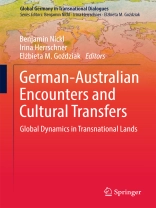This book approaches Australo-German relations from comparative and interdisciplinary perspectives. It maps new pathways into the rich landscape of the Australo-German transnational encounter, which is characterized by dense and interwoven cultural, historical and political terrains. Surveying an astonishingly wide range of sites from literary translations to film festivals, Aboriginal art to education systems, the contributions offer a uniquely expansive dossier on the migrations of people, ideas, technologies, money and culture between the two countries.
The links between Australia and Germany are explored from a variety of new, interdisciplinary perspectives, and situated within key debates in literary and cultural studies, critical theory, politics, linguistics and transnational studies. The book gathers unique contributions that span the areas of migra
tion, aboriginality, popular culture, music, media and institutional structures to create a dynamic portrait of the exchanges between these two nations over time. Australo-German relations have emerged from intersecting histories of colonialism, migration, communication, tourism and socio-cultural representation into the dramatically changed twenty-first century, where traditional channels of connection between nations in the Western hemisphere have come undone, but new channels ensure cross-fertilization between newly constituted borders.Inhoudsopgave
Post-Colonial Narratives of Australian Indigeneity in Austria: The Essl Exhibition on Contemporary Aboriginal Australian Art.- Early German and Austrian migration to Australia.- A rereading of Germans as mediators of Australian identities and history.- The Australian and German Film Festival as transnational spaces.- Muslim German film reframed for Australian public television.- Translations of Australian children literature for German audiences.-
Part III: Music and Media.- The philanthropic history of social relation between Australian and German church musicians.- Transnational connections between Germany and Australia in art.- Transnational Music Connections: Berlin and Melbourne.- Experimental short films between Germany and Australia.- A comparison of educational systems in Germany and Australia.- Cultural diplomacy connecting Germany and Australia.- Multiculturalism and cultural heterogeneity in Germany and Australia.- Conclusion.
Over de auteur
Benjamin Nickl is an assistant professor and instructor in Transnational Studies at the School of Languages and Cultures at the University of Sydney. Master of Arts degrees in American Cultural Studies from the University of Regensburg, Germany, as well as in German Studies and European Studies from Georgetown University, USA, inform his research on transnational Muslim identity discourses in Western societies. Benjamin’s publication record includes inquiries in the global circulation of popular culture products in the new century in the media areas of film, television, and literature.
Irina Herrschner is a research and teaching associate in German Studies at the School of Languages and Linguistics, University of Melbourne. Her doctoral research focuses on cultural diplomacy, global mobilities and transcultural connections. Irina holds a Master of Tourism from Monash University and has published on urban resilience, contemporary mobilities and film induced tourism
. Before coming to Australia, Irina studied and worked in the UK, Spain and Vietnam.
Elżbieta Goździak is Research Professor at the Institute for the Study of International Migration (ISIM) at Georgetown University. Her current research projects include the integration of Central American children and adolescents in the US, urban refugees in Malaysia, adults trafficked to the US and returned trafficked victims in Poland, Moldova, Thailand, and Nepal. Elżbieta was previously an Assistant Professor of Anthropology at the Adam Mickiewicz University in Poznań, Poland, and taught at the Howard University’s School of Social Work in the Social Work with Displaced Populations Program, and managed a program area on admissions and resettlement of refugees in industrialized countries for the Refugee Policy Group. She is a recipient of two Fulbright grants to teach and conduct research in Poznań, a residential fellowship at the Rockefeller Center in Bellagio, Italy, has served as Ed
itor of the journal International Migration and held a senior position with the Office of Refugee Resettlement (ORR) and the Substance Abuse and Mental Health Services Administration (SAMHSA) in the US Department of Health and Human Services.












